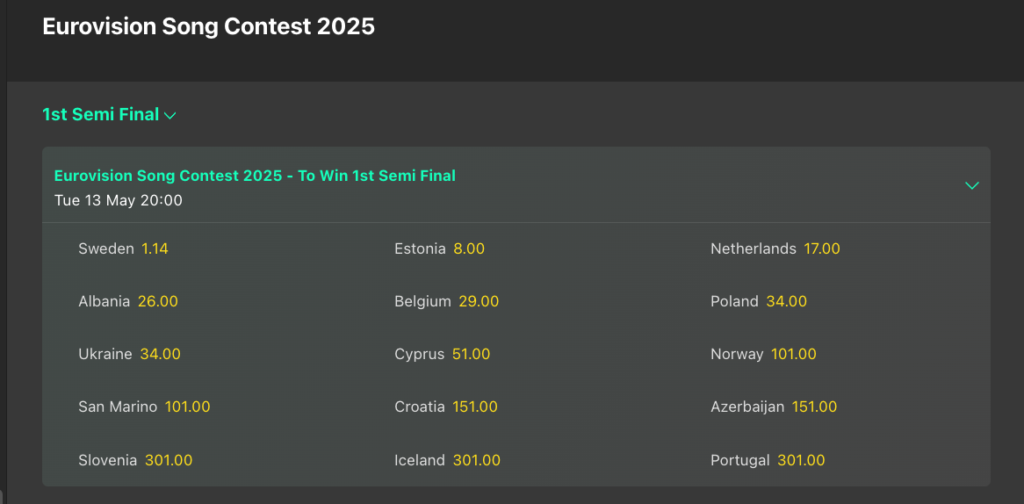

Every spring, the Eurovision Song Contest lights up our screens in a spectacular show combining the weird and wonderful, the musically gifted and musically unique, and not forgetting the occasional example of partisan voting!
This annual spectacle is one of the most popular non-sports betting events of the year and attracts plenty of punters. Many of whom will place wagers on one or more of the several Eurovision Song Contest markets available with top bookmakers such as bet365 Sport.
Open Account Offer: Bet £10 Get £30 in Free Bets
Min Deposit: £5 – Expiry: 30 days – Min Odds: 1/5 (1.20)
← CLICK TO COPY
In this post, we will bring you a little of the history of the Eurovision Song Contest, a look back at some of its more memorable winners (and losers) for the right (and wrong) reasons!
And of course, we will then take you through a look at some of the most popular betting markets that you can find on the Eurovision Song Contest every year with bet365 Sport!
But remember, you need to be a member at bet365 to enjoy the different Eurovision Song Contest betting options. Not only that, but if you sign up (remember to use the promo code BET247), then you can access a wealth of other bet365 features including Bet Boosts and Super Boosts, Free to Play games and much more besides!
So, assuming you are all ready to go, let's now learn a little more about this famous song contest.
The very first Eurovision Song Contest was held on the 24th May 1956 and has grown in size, scope and popularity every year since. Formed by the European Broadcasting Union, it was based on the San Remo Music Festival, which was first held in Italy in 1951.
The voting system of awarding points from 1 to 8, then 10 and then 12 for the best song became part of the Eurovision Song Contest in 1957 and the following year, the tradition of the winning country hosting the next Eurovision Song Contest was inaugurated.
Originally for countries from Europe, the current contest now includes Australia and Israel. Each country submits a song of three-minutes or less in duration by an individual artist or group (of up to six people). Each country has its own qualification competition to decide which artist and song will represent them in the contest.
The expanded Eurovision now includes a Semi Final 1 and Semi Final 2 to ensure that the final does not have too many countries for it to be broadcast live across Europe.
On the day of the final, all the qualifiers perform their song live on stage, with an interval act splitting the showcase of songs in two. Once all songs have been performed, the voting process begins with every competing country submitting their votes in order.
The votes are tallied onto a leaderboard which shows which countries are leading the race to be winner, as well as those stuck on the dreaded ‘nil points'.
The show takes around four to five hours to complete, with countries now only announcing who receives their 10 points and 12 points, as opposed to announcing every point award in the voting.
Now a truly global spectacle, the Eurovision Song Contest is an important part of European culture and has its devoted throng of fans.
But for those classics, we also have a fair few of the less successful ones, equally memorable for a variety of reasons!
Nowadays, the Eurovision Song Contest is so popular that before the Final itself, there are two semi-finals held, from which a number of countries songs will qualify for the final.
These semi-finals are where we start some of the more popular Eurovision Song Contest betting markets.

This is an outright winner market where the 15 or so countries that are competing in one of the two semi-finals can be backed to win their semi-final and thus qualify for the final of Eurovision.
The number of countries competing in each semi-final depends on the number of countries that are participating in the contest and the number of countries granted a place directly into the final.
This is a simple Yes or No bet selection from all the countries that are competing in either of the two Eurovision Song Contest semi-finals that year.
Odds are given on whether the stated country will qualify for the Eurovision Song Contest final (Yes) or whether they will not (No).
The odds on this market can vary quite dramatically with the popular songs being a very short-priced ‘yes' to qualifying for the final, while those songs that are a little more, esoteric and unusual shall we say, are usually higher priced ‘yes' chances, but very low priced ‘no' options to not qualify!
For this bet, bet365 offers a number of countries located within a certain area of Europe, or who are joined by another factor. For the 2025 Eurovision Song Contest the four options available in this market were:
Top Balkan Country
Top Baltic Country
Top ‘Big Five' Country
Top Nordic Country
These three markets are simply a bet on whether the country that you back finishes in the top ten, top five or top four of the final results once all the votes from every country is finalised and the winner known.
Obviously, the odds are longer for a country to finish in the top four or five, compared to that country finishing in the top ten.
This is a bet on how the winning nation of the Eurovision Song Contest reached the final. There are three options for this bet:

This is arguably the most popular bet on the Eurovision Song Contest every year. It is simply a wager on which country will win the contest and therefore, host next year's contest.
*All odds shown in this post were correct with bet365 Sport as of Monday 12th May 2025, but may change in the time following the publication.
Now that you know a lot more about the Eurovision Song Contest and the wide variety of betting markets available on it, why not put your ears to the test and see if you can back this year's winner at bet365!
#AD Bonus Referrer Code is an affiliate of the brands we promote throughout this site. While we strive to maintain accuracy throughout our content, we do receive compensation for this promotion.
© 2025 BonusReferrerCode.com – All Rights Reserved
Worried about your gambling? When the fun stops – STOP!